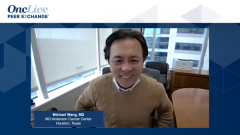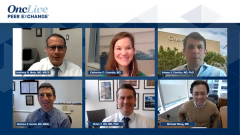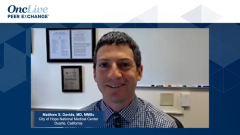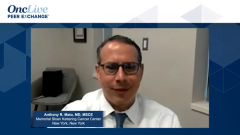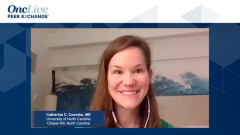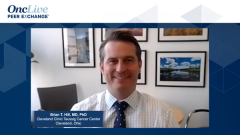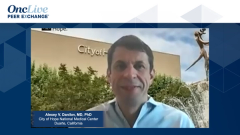
TRANSCEND CLL: CAR T-cell Therapy for CLL
Panelists respond to a question from Michael Wang, MD, about the role of CAR T-cell therapy in CLL, and Brian T. Hill, MD, PhD, summarizes takeaways from the TRANSCEND CLL study.
Episodes in this series

Anthony R. Mato, MD, MSCE: Michael, did you want to add something?
Michael Wang, MD: Yes, I have nothing to add to Matt's explanation. Excellent. But I wanted to ask you [and] the CLL (chronic lymphocytic leukemia) colleagues, when [will] you have a CAR (chimeric antigen receptor) T-cell therapy approved for CLL?
Anthony R. Mato, MD, MSCE: When will we have CAR T-cell therapy approved for CLL? That's a great question. I can speak first, and others can weigh in. I don't have a window into the FDA, but there are maturing data for the lisocabtagene maraleucel product in the heavily pretreated third line or beyond CLL population. Nonrandomized data as monotherapy, I think, are probably the most mature data set, and I think that has a chance for regulatory approval, and maybe accelerated approval outside of the context of a randomized study. What the date is for that, I don't actually know, but I hear it's becoming a hot topic, which means it must be coming up, but I don’t know. Matt, Callie, Alexey, anybody? Brian, do you have any idea?
Brian T. Hill, MD, PhD: Maybe within the next year.
Anthony R. Mato, MD, MSCE: Within the next year. I think CLL is the victim of success from the perspective of developing CAR T because every time it becomes a very relevant topic, there's some new targeted therapy that gets approved or is about to be approved, and it sets the field back a little bit. I think the pendulum is swinging towards CAR and biospecifics as being hot topics in the field right now, Michael. But when? I don't know. Certainly, we all have these patients who are double exposed or triple exposed, [and] patients who are post-pirtobrutinib that are progressing, and they need something else. I think the time seems to be right about at this moment. Good question. I wish we knew the answer.
Matthew S. Davids, MD, MMSc: The other thing I would just add, Anthony, is that CLL is very different from other B-cell non-Hodgkin lymphomas in terms of the degree of immune dysfunction and T cell exhaustion. I think that's been a particular challenge in CLL and getting the CAR T cells to be effective for more patients. Hopefully with various combination partners that can be overcome, at least partially. I think it will still be a limitation in this particular disease.
Michael Wang, MD: I think if they to do it in ALL (acute lymphoblastic leukemia), you can do it too in CLL. I hope so.
Anthony R. Mato, MD, MSCE: We agree. Good point. Brian can you summarize what we have so far from the TRANSCEND CLL 004 study (NCT03331198)?
Brian T. Hill, MD, PhD: I think all 3 of the approved anti-CD19 CAR T-cell therapies have had studies in CLL, some more successful than others. The 1 that's had the most mature and encouraging data is with lisocabtagene maraleucel. This is a single-arm, phase 2 [study] of standard lymphodepletion, and CAR T therapy for patients [with] relapsed/refractory CLL. What you can see is very high response rates, including MRD (minimal residual disease)-negative as responses with manageable toxicity. I think that the key part here really is going to be durability of response. In the broad context of the disease, what type of patients are really going to be best served by CAR T [therapy]? We have such good off-the-shelf oral agents that work very well for a very long period of time. What are we going to do? Where do we see something like lisocabtagene maraleucel approved? Do we really think it's going to be curative therapy? I think that's going to be the key question here.
Anthony R. Mato, MD, MSCE: I think you’ve raised all the key points.
Transcript has been edited for clarity.


